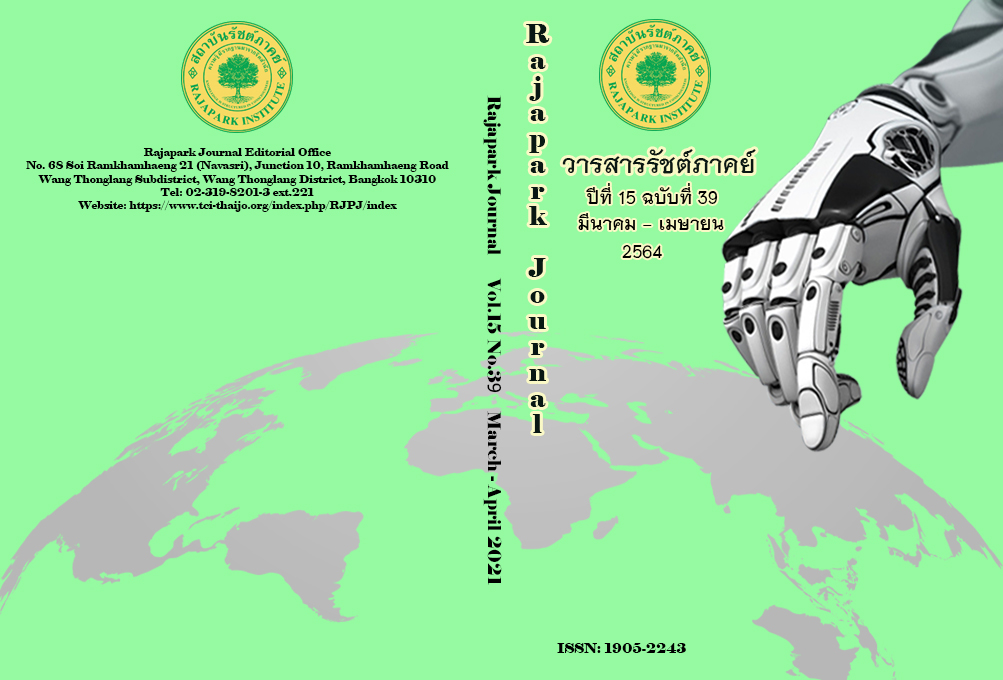The Application of Computer-related Crime Act (No.2) B.E. 2560 (2017) to the Online Romance Scam
Main Article Content
Abstract
Online Romance Scam can be classified as one type of computer related fraud which targets human perception or understanding by using fake or false computer data. Unlike other computer crime such as hacker, his scam does not affect computer security. This scam varies in method and pattern of behavior. The scope of this article was to analyze the application of computer related crime Act to the case of online romance scam. By classifying romance scam into 4 stages, the analysis indicated that computer related crime act could be applied in certain stage of Romance scam such as “Search for victim stage” which is limited to the method of imputing false or fake computer data to deceive the victim in a manner that could possibly affect public. As for relationship making stage and benefit seeking stage which involves the input of fake or false or obscene computer data, the scope of section 14 (1) (2) (4) of the computer related crime Act was restricted merely to the input of data to public. Thus, the interpersonal communication such as “Sexting” was not covered by the offence. Regarding the specific type of “Romance scam” such as “Online dating”, the article found certain limitations of applying section 14 of this Act as well. In addition, “Romance scam” could have relationships with other laws and could cause the victim to be an offender of other laws.
Article Details
Views and opinions appearing in the Journal it is the responsibility of the author of the article, and does not constitute the view and responsibility of the editorial team.
References
Cherdantseva, Y., & Hilton, J. (2013). Information Security and Information Assurance: The Discussion about the Meaning, Scope and Goals, In Organizational, Legal, and Technological Dimensions of Information System Administrator, Almeida, F. PortelaI. (Eds.). Hershey, PA: IGI Global. Pp.167-198.
Federal Bureau of Investigation (FBI). (2017). Romance scam. Retrieved June 9, 2019, from https://www.fbi.gov/news/stories/romance-scams
Frawley, K., Miller, D. W., & Miller, C. (2001). State of Security Features for Medical Information. In Information Technology for the Practicing Physician, section Security of Medical Information, Joan M. Kiel. (Eds.). Springer. Pp. 247-253.
Gattiker, Urs E. (2004). The Information Security Dictionary. Kluwer Academic Publisher.
IC3 (Internet Crime Complaint Center). (2007). Internet Crime Report. Retrieved June 9, 2019, from http://www.ic3.gov/media/annualreport/2007_IC3 Report.pdf
Jakobsson, M. (2016). Case study: Romance Scams, In Understanding Social Engineering Based Scams, Springer. Retrieved June 9, 2019, from https://www.springer.com/gp/book/9781493964550#aboutBook
Longley, D., & Shain, M. (1989). Data and Computer Security: A Dictionary of Terms and Concepts. London: Palgrave Macmillan, UK.
National Research Council. (1991). Computers at Risk: Safe Computing in the Information Age. Washington, DC: The National Academies Press.
Rege, A. (2009). What’s Love Got to Do with It? Exploring Online Dating Scams and Identity Fraud, International Journal of Cyber Criminology, 3(2), 494-512.
Rustad, M. (2014). Global Internet Law (Hornbook Series). St. Paul, MN: West Academic Publishing.
Thongraweewong, K. (2018). Legal Limitations Relating to the Application of Thai Computer–related Crime Act of B.E. 2560 in the Case of “Phishing”, paper presented in the 9th International Science, Social Science, Engineering and Energy Conference I-SEEC 2018, Bangkok, Thailand.
Thongraweewong, K. (2020). Computer Crimes Law, Volume 1: Offences against computer and data security. Bangkok: Nititham.
Thongraweewong, K. (2021). Computer Crimes Law, Volume 2: Offences against Computer Fraud, Spam and other offences. Bangkok: Nititham.
Tilley, N., & Sidebottom, A. (2017). Handbook of Crime Prevention and Community Safety (2nd ed.). London: Routledge.
Whitty, M.T., & Buchanan, T. (2012). The Online Romance Scam: A Serious Cybercrime. Cyber Psychology, Behavior, and Social Networking, 15(3), 181-183.


